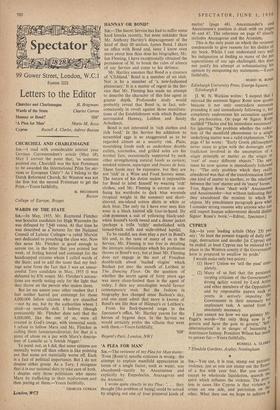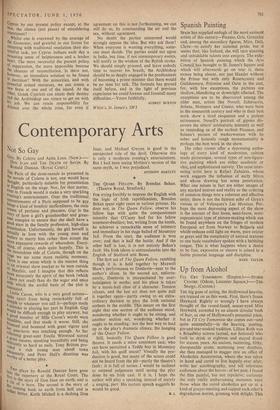SIR,—You can, it is true, stamp out patriot ic violence, just
as you can stamp out the flames of a fire with your feet. But you canoe," except by wholesale liquidation, quench the spirit which inflames the violence. The Pr°11.: lem in cases like Cyprus is that violence l' crime on one side, and patriotism on the other. What then can we hope to achieve 1° Cyprus by our present policy except, at the best, the silence (not peace) of smouldering resentment?
Whilst one is overawed by the courage of the Governor, and grateful to our forces for accen with trditiona resolutin thir dis- taste pfuti gl task, yeta Cyprusl induceso eache day a mounting sense of helplessness and a leaden heart. The more successful the present policy of suppression, the more impossible become the chances of reconciliation. Is there not, however, an immediate solution to be found in partition? With the minorities, and with Powerful armed resources, we can create a new State at one end of the island. At the other, Greek Cypriots can attain their destiny and the Archbishop can return to get on with Ina job. We can retain responsibility for defence over the whole zone, for even if
agreement on this is not forthcoming, we can still do so, by commanding the air and the sea, without agreement.
No doubt the parties concerned would strongly oppose the idea. But why ask them? When everyone is wanting everything, some- one must decide. The parties could not agree in India, but time, if not contemporary events, will testify to the wisdom of the British stroke. We should simply proceed, and leave nobody time to recover his breath; the Archbishop should be so deeply engaged in the predicament of becoming a prime minister that there would be no time for talk. The formula has proved itself before, and in the light of previous experience we could foresee and forestall many difficulties.—Yours faithfully,



































 Previous page
Previous page